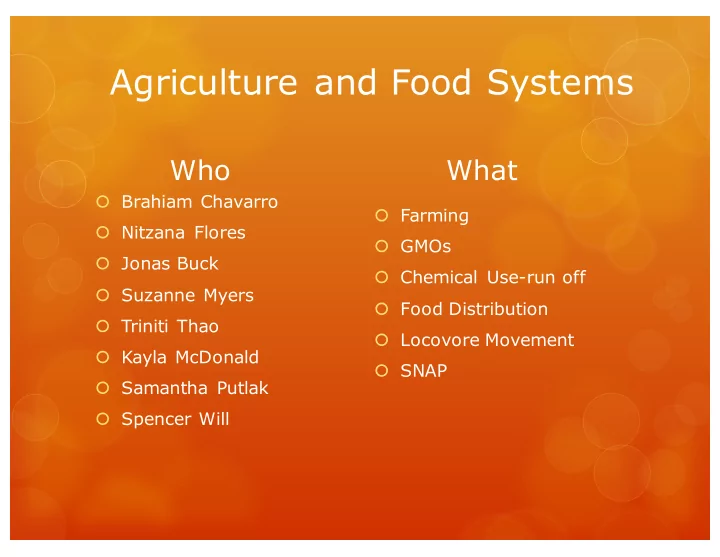

Agriculture and Food Systems Who What Brahiam Chavarro Farming Nitzana Flores GMOs Jonas Buck Chemical Use-run off Suzanne Myers Food Distribution Triniti Thao Locovore Movement Kayla McDonald SNAP Samantha Putlak Spencer Will
Agriculture Agriculture: The science or practice of farming, including cultivation of the soil for the growing of crops and the rearing of animals to provide food, wool, and other products
Farming: Hydroponics Definition - A method of growing plants using mineral nutrient solutions, in water , without soil. Researchers discovered that while plants absorb essential nutrients, soil is not essential for plants to grow. In the wild, soil acts as a provider for nutrients but isn’t necessary with when artificial nutrients are introduced in the water .
Hydroponics: Pros Increased rate of growth (25%) and production (up to 30%) Reduces waste and production from soil runoff Decreased need for herbicides
Hydroponics: Cons High in cost Long prep time Needs a lot of specific attention Fragile environment A lot of fresh water is needed
GMOs Definition- Genetically modified organisms whose genetic material has been altered using genetic engineering techniques. “HARDER. BETTER. FASTER. STRONGER.”
GMOs: Pros Higher yields Better quality/taste Healthier animals Vitamins and minerals (added) Look better Subsidized Better resistant to weeds
GM0s: Cons Health risk in humans (i.e.: cancer , food allergies, organ damage Environmental risks No long-term testing Higher runoff Higher chemical intensities Expensive May infringe on religious beliefs: An individual practicing a religion forbidding the consumption of pork may unknowingly eat fresh produce contain a gene from a pig.
Runoff Runoff: “Water pollution: agricultural or industrial waste • products that are carried by rainfall and melting snow into surface waters”
Runoff: Cons Erosion Detrimental to fragile ecosystems of nearby waterways Large expenses Compilation of chemical compounds (fertilizers, pesticides, herbicides) Farmers are not under the jurisdiction of the Clean Water Act
Food Distribution Food Desert: Populated area with no access to fresh produce Food Deserts are caused when large corporations hold monopoly over an area and cause local businesses to shut down The University of Minnesota campus is a large Food Desert, caused by the Monopoly of the Target Corporation
Farmers’ Market Farmers’ Market: a food market at which local farmers sell fruit and vegetables and often meat, cheese, and bakery produce directly to consumers.
SNAP SNAP (Supplemental Nutrition Assistance Program): Provides nutritional assistance to eligible, low-income individuals and families, and provides economics opportunities to the community The Food and Nutrition Service works with State agencies, nutrition educators, and neighborhood and faith-based organizations to ensure that those eligible for nutrition assistance can make informed decisions.
Recommend
More recommend